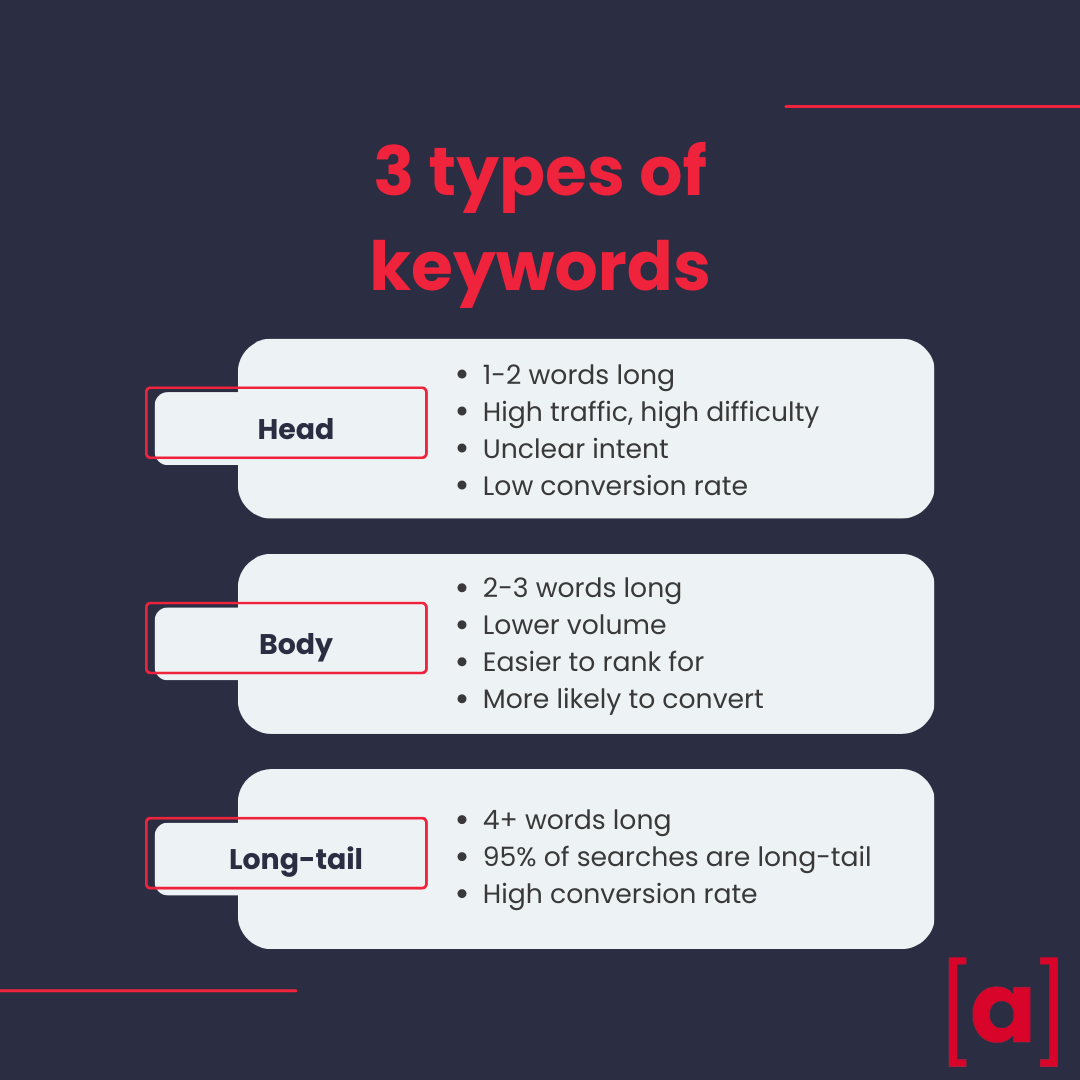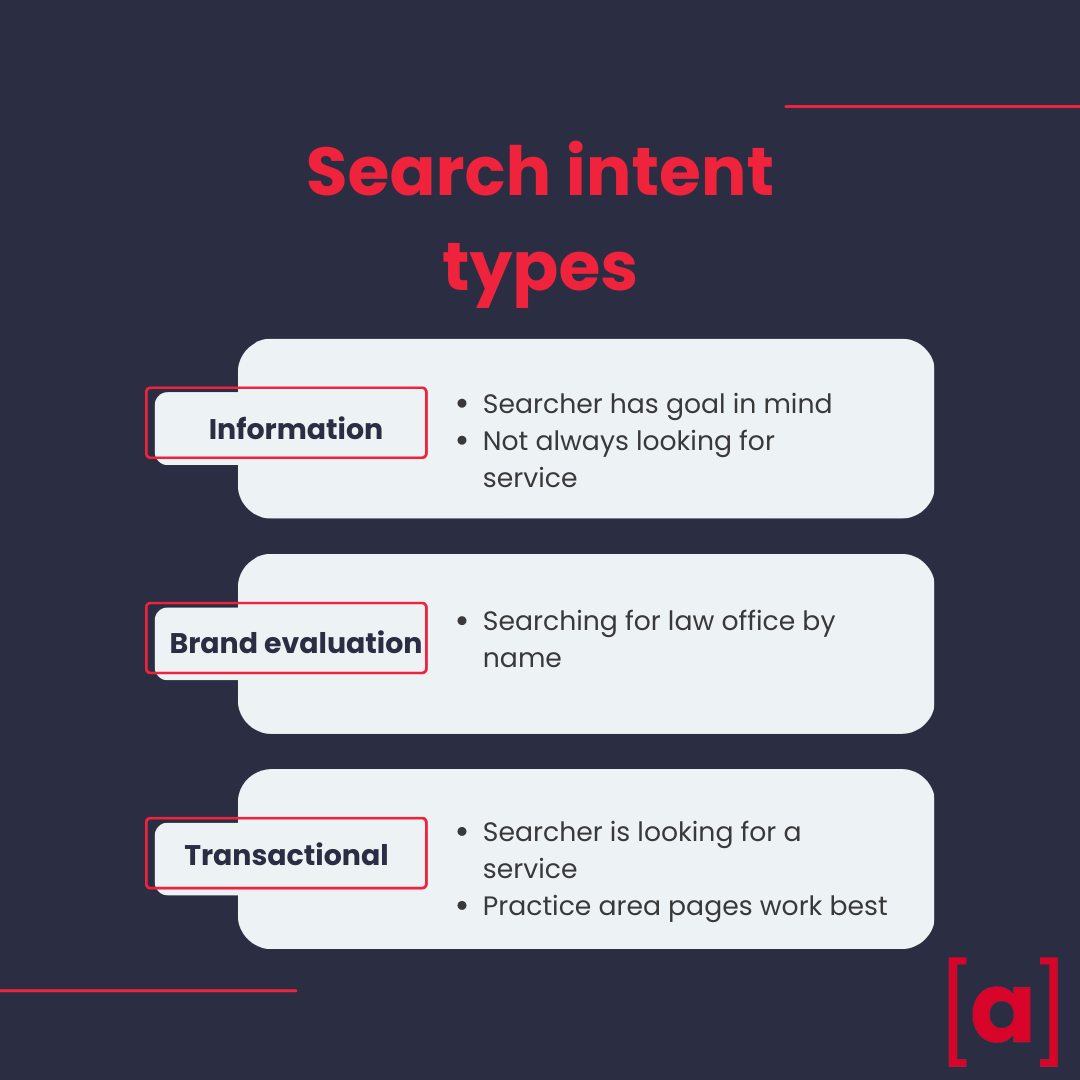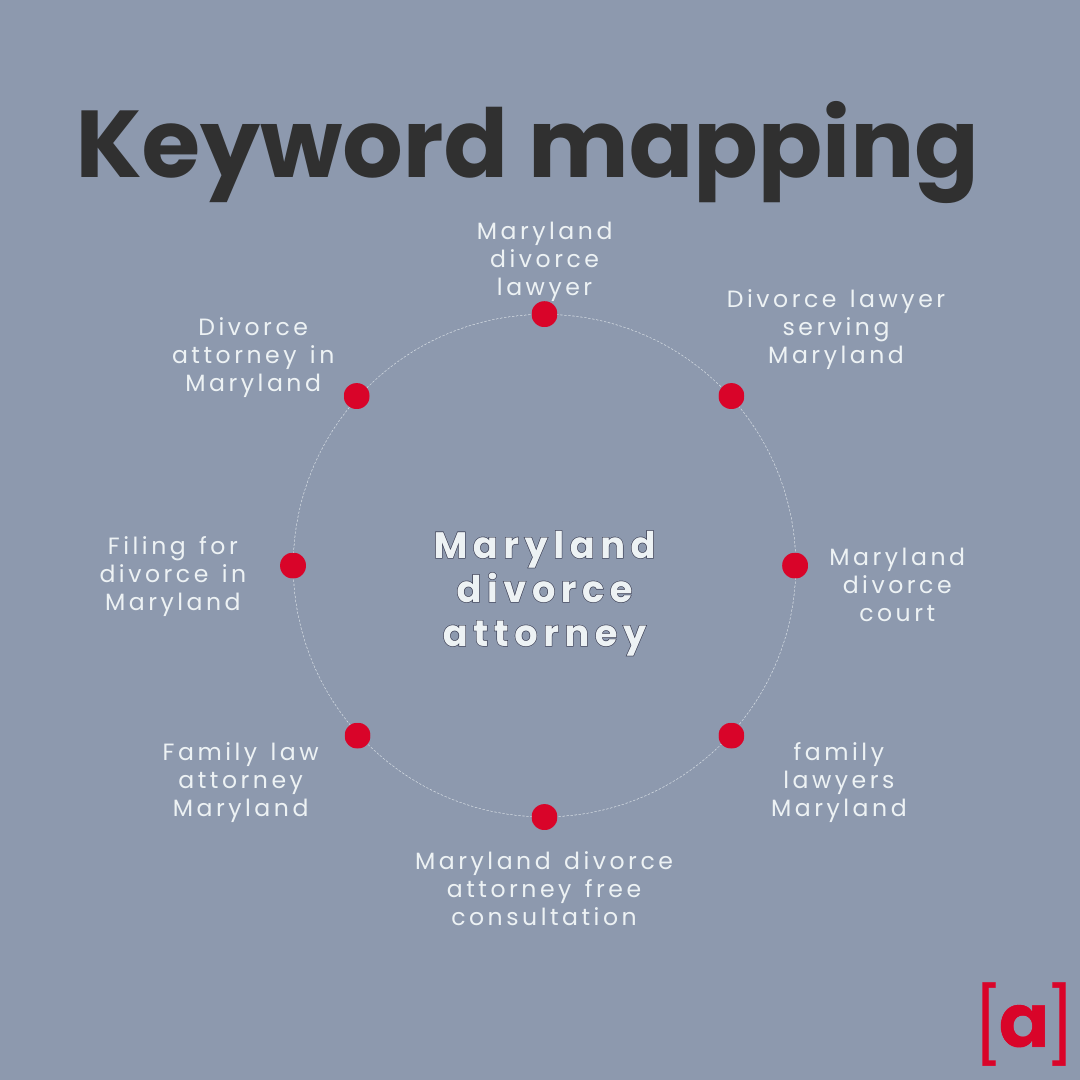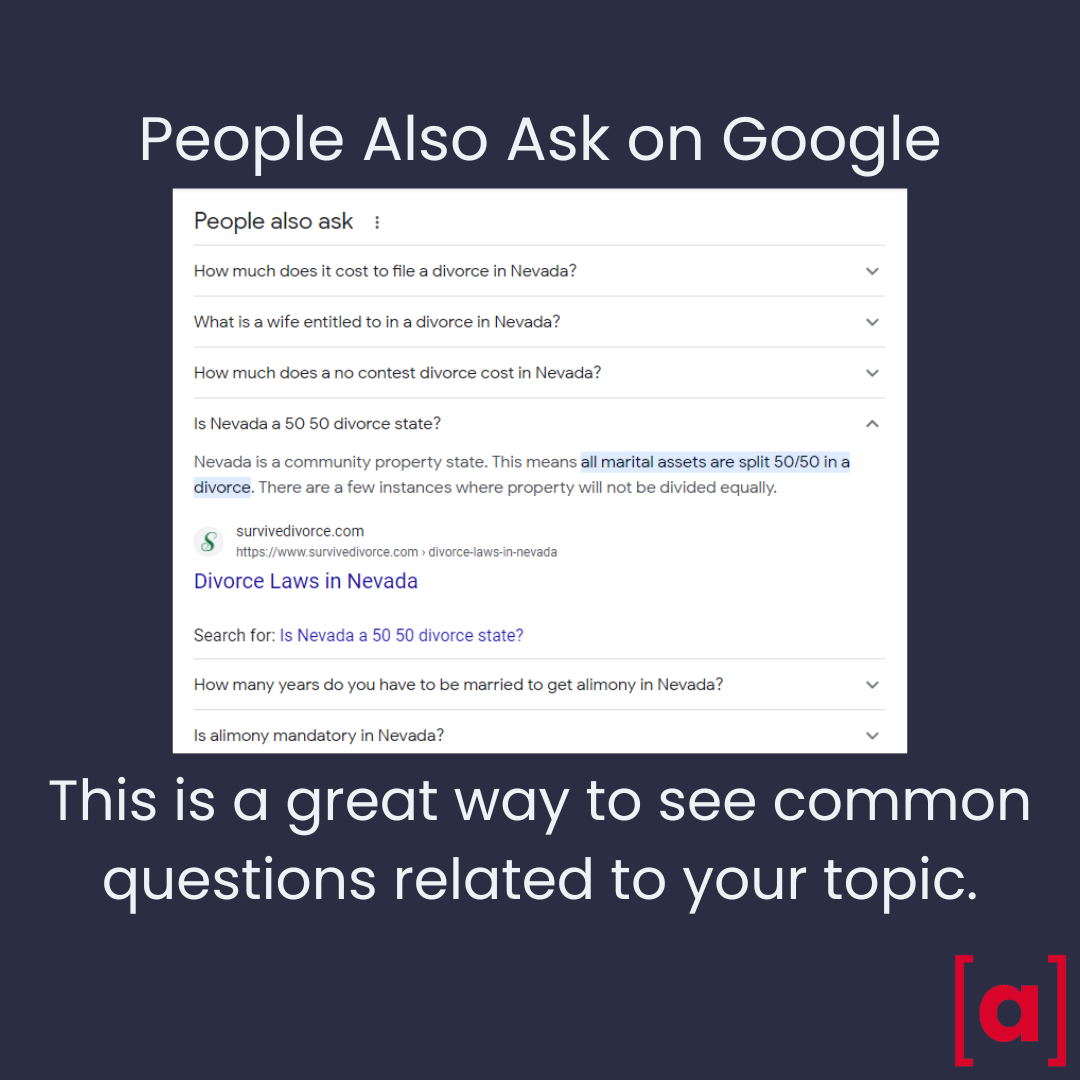
- Top takeaways from this chapter
- Understanding the basics of keyword research for law firm SEO marketing
- How to identify the right keywords for your law firm’s SEO strategy
- Competitive keyword analysis: how to stay ahead of other law firms in your niche
- Keyword mapping for law firm websites: optimizing content for maximum SEO impact
- Keyword research best practices for law firm SEO marketing
- Keyword research tools for law firms
- Balancing SEO and legal compliance: keyword research for ethical law firm marketing
- Find the keywords to the kingdom
Law Firm SEO Marketing Keyword Research
In 2017, Ahrefs conducted a survey of over one billion web pages. Over 90 percent of the pages they surveyed received absolutely no organic search traffic from Google. This includes legal websites. This is likely due to two factors: lack of backlinks and lack of keyword research. Publishing marketing content with no regard for keywords is a waste of your time and money. Before you can write any content for your site, you should conduct keyword research to determine the most effective content strategy for your firm. In this chapter, we will introduce you to the fundamentals of keyword research, keyword mapping, and how to optimize your content based on your findings.
Top takeaways from this chapter
- What keyword research is
- How to determine search intent
- How to build a keyword map
- How to use keywords to optimize your website and outrank competitors
- Keyword tools you can use
- How to balance keyword strategy with ethical marketing and ABA compliance
Understanding the basics of keyword research for law firm SEO marketing
Keywords are important terms. They are exactly what your potential clients are entering into the search engines to find the personal injury lawyer, criminal defense lawyer, or a firm that can offer legal advice for a wide range of their needs. Choose keywords that help Google to know when to put your website in front of these potential clients.
Types of keywords
There are several key types of keywords that are valuable here. Each type is important and takes a bit of different research and development.
Head keywords
Head keywords are one to two words in length and tend to be high volume but also high difficulty. These are keywords like “lawyer” or “divorce.”
In most situations, these are very difficult and inefficient to target for several reasons.
- We don’t know what the searcher’s intent is. What are they really looking for? Do they seek legal advice, want to know what a lawyer does, or perhaps want to become an attorney?
- Websites that rank for these words typically have very high domain authority. It is nearly impossible to rank for them yourself, especially if you have a small or mid-sized firm.
There’s little chance your site will outrank websites like Wikipedia and Merriam-Webster for head keywords.
Body keywords
Body keywords are a bit longer, usually about two to three-word phrases. Some examples may include “personal injury attorney” or “DUI attorney in Charlotte.” These are lower volume keywords, which means fewer attorneys are incorporating them into their law firm SEO plans.
That means they are easier to rank for and, as a result, more likely to convert to leads.
You’ll also hear these called main keywords or primary keywords. That’s because the website page that has these keywords is likely using it as the main focus of that page. They build content around that keyword. Most often, these keywords are also lower down the sales funnel, which means people are more likely to seek them out when they are ready to become a client. That makes them more likely to convert into leads for you.
Most of the time, attorneys will use their service areas as body keywords. They should always be specific to your law firm. Even for search engine optimization (SEO), there is no benefit to including keywords that don’t represent your services properly.
Long-tail keywords
Typically four or more words in length, long-tail keywords are very specific. For example, a long-tail keyword may be, “Do pedestrians always have the right-of-way in Florida.”
The majority of Google searches are related to these types of keywords. For example, someone may ask, “When should I hire a defense attorney in New York.” They may be very specific questions, or they could be deep searches for information such as “criminal accident lawyer in Georgia with the best rating.”
Targeting this type of keyword works well for law firms. Typically, your law firm’s website will target a range of these keywords. The right keywords draw in the target audience you’re after. About 95 percent of Google searches are over four words like these.
Understanding search intent
A core goal of digital marketing is bringing people to your law firm website because they want your service. To do that, we have to understand what the person behind the keyboard is actually thinking, needing, and wanting from the search. We call this search intent.
Information searches
Many times, a person searching for something is looking for very specific information. If they type in “PIP insurance laws in Michigan,” they have a very specific goal. They need to understand the law for some reason, but they are not necessarily looking for a personal injury attorney.
Brand evaluation searches
Sometimes, the individual is searching for a specific law office. They may be typing in the name of the firm itself. These people are often performing a brand evaluation. They want to see what the law firm has to offer and if it is suitable for their needs.
Google offers search results that are relevant to that lawyer or law firm. This could include the law firm’s website, profiles of the firm or attorneys on legal directories, and online reviews.
It’s not difficult to rank for branded keywords like this that are relevant to you and your firm. A good starting place is to ensure your Google Business Profile is accurate and up to date. That’s a component of local SEO that can be just as important to your marketing strategy.
To learn more about maximizing your Google Business Profile for lead acquisition, check out our local SEO Guide.
Transactional searches
A transactional search is one in which a person intends to purchase goods or services. These are people who are looking to purchase legal services from law practice. They may use search terms like “best personal injury lawyer North Carolina.” The searcher here seems to be looking for a personal injury attorney.
These are some of the most important keywords for your law office. That is because they tend to have a high chance of conversion into new clients.
How to identify the right keywords for your law firm’s SEO strategy
Which keywords are the right keywords? How do we find out what the search queries even are?
Choosing keywords based on intent
Some keywords that are high volume and topical to your firm’s practice area may still be useless for your site. For example, the keyword “car crash” may be relevant to your practice if you cover personal injury law, but the searcher is probably looking for recent news articles, not a lawyer. Therefore, it would be a waste of your resources to target this keyword. It’s not likely to have any conversion success.
On the other hand, some keywords with low search volume could still be highly productive for gaining leads. For example, the keyword “military divorce attorney in Suffolk” may be low volume, but the searcher’s intent is likely to be finding law firms to help them. This kind of long-tail keyword has a higher chance of conversion. This is why it is likely to be a part of your SEO campaign and content strategy.
Local SEO for law firms: targeting keywords for geographical relevance
Google search results for attorneys also focus on location. Most people that live in California have little use for an attorney in Montana. That’s where local search results come into play. Google ranks local search results based on relevance, distance, and prominence.
When someone searches “ divorce lawyer near me,” Google shows them results within a certain radius of their location. If you are looking for someplace new to try for dinner tonight, you may perform a similar search, “restaurants near me.” You don’t know the name, but you want something close to where you are. Google shows you what’s available close to your location.
The same applies to attorneys. That’s why it is so important to be selective about your primary keywords. These are critical to get right. Just focusing on “malpractice lawyer” isn’t enough.
We’ll discuss more about local SEO in a later chapter – don’t skip that chapter!
Competitive keyword analysis: how to stay ahead of other law firms in your niche
When planning an SEO campaign, we cannot just focus on the search queries related to your website. We also have to think about your competitors.
Research your competitors
Start by figuring out which keywords your competitors are ranking for in the search engines. This shows you both the strengths and weaknesses of their SEO strategy and the kinks in their armor that you can exploit in your own digital marketing campaign.
By conducting this kind of research on your competitors, you can understand what your site’s competition is for your targeted keywords and tailor your strategy to it.
This will require access to SEO tools, which can become quite costly. This is why most successful law firms hire dedicated digital marketing agencies. Our SEO services utilize the very best of these tools.
Keyword mapping for law firm websites: optimizing content for maximum SEO impact
To find the best keywords, we need to do some research and planning. To choose the best keyword phrases, we want to engage in keyword mapping.
What is keyword mapping?
Keyword mapping is the framework for how your website targets keywords. This map will mirror your site’s hub-and-spoke model of topical clusters. Keyword mapping guides your internal linking strategy, which in turn helps your readers navigate your site.
A keyword map optimizes your site page-by-page so that when Google crawls your site, the intent is clear, and there is no keyword cannibalization.
Creating a keyword map
There are several steps to this, and again, using keyword research tools can help identify the specific keyword best suited for your needs.
Identify your primary keywords
First, we need to determine which are your primary keywords, those that we want to target the most. Choose which keywords you want to target primarily.
Create secondary keyword clusters
You don’t need a whole website or even an entire landing page with the focus on just one keyword. It should include secondary keywords. For each primary keyword, include a list of variant keywords and secondary keywords that support the primary keyword.
For example, if your primary keyword is “Maryland divorce attorney,” your variants would likely include keywords like “divorce attorney in Maryland” and “divorce lawyer serving Maryland.” Your secondary keywords may include phrases like “Maryland divorce court” or “filing for divorce in Maryland.”
Outline your site’s pages
Create an outline of your site’s hub pages and their corresponding spoke pages. Assign each page a primary keyword, its keyword variations, and secondary keywords. Then, use the primary keyword to create the page title, headers, meta description, and other elements that support SEO and good legal marketing.
Optimize your pages
Once you created your map, examine it for any inefficiencies. Here are some key concerns:
- Are there any duplicate or overlapping pages?
- Are there any missing pages or unused keywords?
- Are there irrelevant or useless pages on your site?
- You can also use your map to improve your overall structure.
- Are there any opportunities for internal links between pages?
- Are there any technical issues with Google crawling your site? You can use Google Search Console to check if your site is indexing properly.
Update regularly
You’re doing a lot of work to get all of this right, but what you may not know is that you may need to update the specific keyword or the secondary keywords over time, as your keyword research tools suggest.
Do this at least annually. Your site should also be checked for duplicate and overlapping pages as you work to add more content and pages to it. Make sure your content is both up-to-date and accurate, as that helps it remain relevant.
Laws change often. While you may always be an immigration lawyer, people may start searching for new laws regarding immigration over time. You’ll want to make sure your data is up to date. Regular audits can help you to pinpoint areas of concern.
How to avoid keyword cannibalization
Keyboard cannibalization occurs when two or more pages on the same website compete for the same keyword. For example, if you have one page titled “Texas personal injury attorney” and another page titled “personal injury attorney in Texas,” these would compete against one another since the content is likely too similar. There’s no benefit to trying to outrank yourself from one page to the next. This reduces the effectiveness of both pages.
To avoid it, check your keyword map for any overlapping keywords or clusters. If you’re unsure if there’s overlap, search for the primary keywords. Do both of the pages show up? If the same or similar pages show up for both searches, there’s some overlap occurring that needs adjustment. Consider merging those pages into a single landing page to avoid this.
Keyword research best practices for law firm SEO marketing
Getting it right takes expertise whenever possible. That means working with marketing services like Array Digital. Luckily, we want you to learn everything you need to about related keywords to your legal practice and website design goals.
Emphasize quality over quantity
It’s much more important that you create quality pages as opposed to numerous low-quality pages. Gary Illyes, Google’s webmaster trends analyst, stated in a 2016 virtual keynote that low-quality pages with no value add can harm your SEO strategy. Google rewards sites with fresh information that adds value for their users, not sites that offer the same tired, recycled material found elsewhere.
“It’s just not worth it because one thing is that we don’t necessarily want to index those pages. We think that it’s a waste of resources. The other thing is that you just won’t get quality traffic. If you don’t get quality traffic, then why are you burning resources on it?” he says.
Over time, content automation will continue to grow and excel. However, it is important that you create human-first content. That is, we want to ensure the person that was just in an accident and has an insurance company trying to settle for less than they owe has a compassionate, highly skilled car accident lawyer available to them. Automation doesn’t communicate what people can.
If you are writing content solely for Google search engines, you’re hurting your law firm’s potential success online.
Target low-difficulty keywords at first
Let’s get your family law attorney or law firm on the map first.
High-difficulty keywords are not worth your effort if you’re just getting started with SEO. Competing with multi-generational law firms will prove incredibly difficult. Furthermore, your law firm’s website will not outrank robust sites with high domain ratings like Forbes or Wikipedia.
Instead, aim for low-difficulty keywords. Ideally, you should have some keywords that are low difficulty and high volume. For example, a keyword relevant to your practice area with a volume of 800 monthly searches and few competitors would be a great choice.
Low-volume keywords can be very useful to law firms. Geo-targeted keywords, such as “Norfolk VA car accident lawyer” may not have a noticeable volume, below 100 or even below 10 in some cases, but they are valuable.
First, long-tail keywords tend to have higher conversion rates. Second, by targeting a specific city or area, you signal to Google that you are relevant to that query in local searches, meaning you are more likely to rank in searches done by locals looking for services you render.
Keyword research tools for law firms
You’re going to need some help with this process. While we encourage you to turn to the pros for help with your marketing, we also want you to know how to do it yourself. Here are some tools to help you.
Legal forums
You can search through the Q-and-A sections of legal forums like Justia, r/LegalAdvice on Reddit, and Avvo. Users go to these sites to ask questions and get answers from lawyers. Those questions can give you some ideas for keywords to target on your own site.
Google Trends and Google Analytics
Google has a few free tools for keyword analysis you should be using: Google Trends and Google Analytics.
Google Trends
Google Trends is a free tool that analyzes trends in Google searches. You can use it to examine whether your keywords are increasing or decreasing in traffic. It will also offer keywords related to your query, expanding your bank of usable keywords.
Google Trends can also highlight search queries trending due to changes in legislation, such as cryptocurrency or cannabis. If a trending topic is related to your practice area, you could research some of the related, trending keywords for use in your own SEO strategy. For example, changes to cryptocurrency have recently impacted estate planning. If you are a family law attorney, you may wish to dive into this topic to flesh out your strategy.
Suggested Searches and People Also Ask
Perform a Google search right now. When you do, you’ll see two additional useful features that typically appear: Suggested Searches and People Also Ask.
Suggested Searches
These are related searches offered by Google when you search for a topic. This is usually because they are topically relevant to your search. These suggestions can be a great place to get keyword inspiration for your keyword planner.
People Also Ask
You likely have seen this section when Googling something as well. This area has additional search queries that are related to a search. When you click on one of these questions, a snippet of information is provided to answer that question. This can give you additional insight into the topic and keywords you want to work towards.
When you click on one question, more questions in the section populate. That gives you more questions to help guide your keyword planning.
Ubersuggest
Ubersuggest is a free keyword research platform that allows you to examine a website’s keywords and traffic. You can use this to analyze your own results or those of a competitor to see how they are and what their SEO marketing strategy is. Ubersuggest also lets you search by keyword and recommends related keywords.
Semrush
This is another free tool that provides keyword overviews and website traffic analysis. Semrush also has a Keyword Magic Tool that creates keyword suggestions and then generates a list of related keywords. It also includes a keyword manager, which allows you to create and then store lists of keywords.
Before you use these tools, though, be sure to vet the keywords. You want to be sure they are actually valuable and applicable to your website. You may later use these types of tools to help you with your pay-per-click, PPC, and social media marketing efforts. Keep in mind that just because a tool says you should target them doesn’t mean they are ideal for your website. Whether for your SEO or your PPC campaigns, researching the validity of those keywords helps.
Balancing SEO and legal compliance: keyword research for ethical law firm marketing
Before moving on, we need to discuss the two types of SEO marketing: white hat and black hat.
Black hat SEO is unethical SEO technicians that unscrupulous companies use to improve search engine ranking. These methods include:
- Using hidden text to pad your site with extra keywords
- Excessive, low-quality link-building
Spammy content like this that uses lots of keywords may create a short-term bump in your site’s rankings (and that’s just what these companies realize and are after). However, they are a high risk of ruining your website’s domain rating in the long term. It’s difficult to recover that domain rating once Google figures out what you are doing (which it will) and penalizes the site. Just avoid those methods because that short-term bump isn’t likely to produce quality leads.
White hat SEO focuses on techniques like those in this guide, all of which Google approves and recognizes as valuable.
Aside from the ethical implications of the SEO techniques themselves, law firms have stricter regulations by both the American Bar Association and Google.
Google considers law firm websites to be a Your Money, Your Life (YMYL) service, meaning it can have a significant impact on the finances or well-being of a person and therefore is held to more stringent standards than opinion blogs or entertainment content.
The American Bar Association also places restrictions on the language employed by attorney websites. An SEO firm with experience working with law firms knows not to include language that implies expertise or guaranteed results.
Find the keywords to the kingdom
Don’t put your site at risk for such an important element as keywords. Let Array Digital do the work for you and ensure only the best methods are ever in use.
now by filling out the form on our site or call 757-333-3021
to speak to a trusted attorney SEO specialist.






